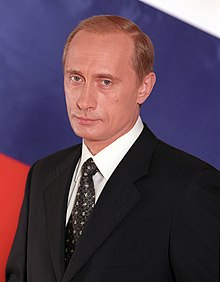
Hans-Dietrich Genscher was a German statesman and a member of the liberal Free Democratic Party (FDP), who served as Federal Minister of the Interior from 1969 to 1974, and as Federal Minister for Foreign Affairs and Vice Chancellor of Germany from 1974 to 1992, making him the longest-serving occupant of either post and the only person to have held one of these positions under two different Chancellors of the Federal Republic of Germany. In 1991 he was chairman of the Organization for Security and Co-operation in Europe (OSCE).

Václav Havel was a Czech statesman, author, poet, playwright, and former dissident. Havel served as the last president of Czechoslovakia from 1989 until the dissolution of Czechoslovakia on 31 December 1992 and then as the first president of the Czech Republic from 1993 to 2003. He was the first democratically elected president of either country after the fall of communism. As a writer of Czech literature, he is known for his plays, essays, and memoirs.
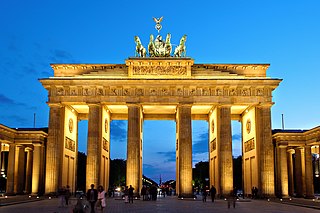
The Brandenburg Gate is an 18th-century neoclassical monument in Berlin, built on the orders of Prussian king Frederick William II after restoring the Orangist power by suppressing the Dutch popular unrest. One of the best-known landmarks of Germany, it was built on the site of a former city gate that marked the start of the road from Berlin to the town of Brandenburg an der Havel, which used to be the capital of the Margraviate of Brandenburg.

Viktor Andriyovych Yushchenko is a Ukrainian politician who was the third president of Ukraine from 23 January 2005 to 25 February 2010. He aimed to orient Ukraine towards the West, towards the European Union and NATO.

Presidential elections were held in Ukraine on 31 October, 21 November and 26 December 2004. The election was the fourth presidential election to take place in Ukraine following independence from the Soviet Union. The last stages of the election were contested between the opposition leader Viktor Yushchenko and incumbent Prime Minister Viktor Yanukovych from the Party of Regions. It was later determined by the Ukrainian Supreme Court that the election was plagued by widespread falsification of the results in favour of Yanukovych.

The Orange Revolution was a series of protests and political events that took place in Ukraine from late November 2004 to January 2005, in the immediate aftermath of the run-off vote of the 2004 Ukrainian presidential election, which was claimed to be marred by massive corruption, voter intimidation and electoral fraud. Kyiv, the Ukrainian capital, was the focal point of the movement's campaign of civil resistance, with thousands of protesters demonstrating daily. Nationwide, the revolution was highlighted by a series of acts of civil disobedience, sit-ins, and general strikes organized by the opposition movement.

Yulia Volodymyrivna Tymoshenko is a Ukrainian politician, people's Deputy of Ukraine, Vice Prime Minister of Ukraine for the fuel and energy complex (1999–2001), Prime Minister of Ukraine from February to September 2005 and from December 2007 to March 2010. She was the first and so far the only woman to serve as prime minister of Ukraine. She has the degree of Candidate of Economic Sciences.
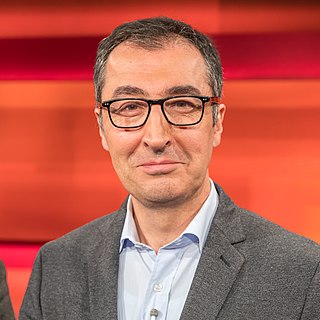
Cem Özdemir is a German politician who currently serves as Federal Minister of Food and Agriculture since 2021. He is a member of the Alliance 90/The Greens party.

Olafur Eliasson is an Icelandic–Danish artist known for sculptured and large-scaled installation art employing elemental materials such as light, water, and air temperature to enhance the viewer's experience.

Matthias Platzeck is a German politician. He was Minister President of Brandenburg from 2002 to 2013 and party chairman of the SPD from November 2005 to April 2006.

Ruprecht Polenz is a German politician and member of the Christian Democratic Union (CDU) political party.

The American Academy in Berlin is a private, independent, nonpartisan research and cultural institution in Berlin dedicated to sustaining and enhancing the long-term intellectual, cultural, and political ties between the United States and Germany. Each year, the Academy's independent search committee nominates circa twenty fellows from among hundreds of applicants to pursue semester-long research projects at the Hans Arnhold Center, a historic villa on the shores of Lake Wannsee. Fellows, who come from the humanities, social sciences, public policy, and the arts, share their work with German colleagues and audiences at lectures, readings, discussions, concerts, and film screenings, which form the core of the Academy’s program of nearly 100 public events per year. The American Academy in Berlin has an office in New York City and its board of trustees is composed of several dozen influential leaders from German and American business, finance, culture, and academia.

Gerhard Fritz Kurt "Gerd" Schröder is a German lobbyist and former politician, who was the chancellor of Germany from 1998 to 2005. From 1999 to 2004, he was also the Leader of the Social Democratic Party of Germany (SPD). As chancellor, he led a coalition government of the SPD and Alliance 90/The Greens. Since leaving public office, Schröder has worked for Russian state-owned energy companies, including Nord Stream AG, Rosneft, and Gazprom.
The Falling Walls Science Summit is an annual science event in Berlin, Germany, which takes place between 7 and 9 November and coincides with the anniversary of the Fall of the Berlin Wall. Guided by the question "Which are the next walls to fall in science and society?" the Science Summit aims to showcase scientific breakthroughs, foster a dialogue between science and general public and connect global leaders from science, business, and media to develop solutions for the greatest challenges of our time. Originally being a one-day conference, the summit has expanded and now includes three days: Falling Walls Pitches on 7 November, Falling Walls Circle on 8 November and Falling Walls Breakthrough Day on 9 November.
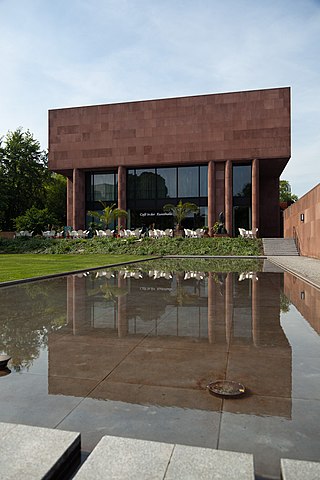
The Kunsthalle Bielefeld is a modern and contemporary art museum in Bielefeld, Germany. It was designed by Philip Johnson in 1968, and paid for by the businessman and art patron Rudolf August Oetker.
The Confucius Peace Prize was a Chinese alternative to the Nobel Peace Prize established in 2010 by the Association of Chinese Indigenous Arts in the People's Republic of China (PRC). The prize was created in response to a proposal by businessman Liu Zhiqin that criticized the 2010 Nobel Peace Prize, which was awarded to Chinese dissident Liu Xiaobo. The chairman of the committee said that the award existed to "promote world peace from an Eastern perspective", and Confucian peace specifically. The original cash prize given to the winner in 2010 was ¥100,000 RMB (US$15,000).
The Václav Havel Human Rights Prize is an annual €60,000 award which honours "outstanding" civil society action in defence of human rights, in Europe and beyond. Individuals, non-governmental organisations and institutions working to defend human rights anywhere in the world may be nominated. Seven of the ten winners to date were in detention because of their human rights activities at the time they received the prize.
Studio Olafur Eliasson was founded in 1995 by Danish-Icelandic artist Olafur Eliasson. Based in Berlin, the studio currently comprises about 90 people, from architects, craftsmen, and specialised technicians, to art historians and archivists. Working closely with the artist, the studio team engages in experiments; develops, designs, and produces artworks, exhibitions, and architectural projects; and communicates and contextualises Eliasson's work. Further architectural projects include the Serpentine Gallery Pavilion 2007, London, with Kjetil Thorsen; Your rainbow panorama, for ARoS Aarhus Kunstmuseum, 2011; and the Harpa concert hall & conference center in Reykjavik, Iceland, for which Studio Olafur Eliasson, together with Henning Larsen Architects and Batteríid architects, received the Mies van der Rohe Award 2013.

The “Prize of the Böttcherstraße in Bremen” is a German award in the field of contemporary art that was first presented in 1954, making it one of the oldest awards of its kind. According to the Prize's rules, the award is “intended to honour visual artists living in the German speaking area who have not yet received a public distinction of a kind corresponding to the quality of their work”. From 1985 to 1991, the award was called "Bremer Kunstpreis".
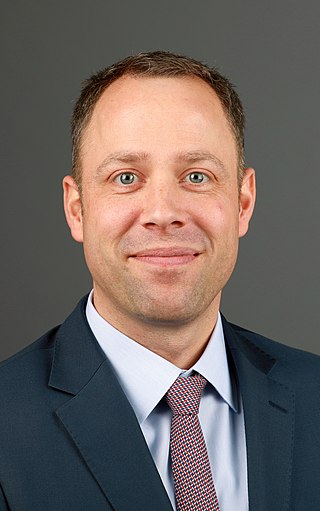
Mario Czaja is a German politician of the Christian Democratic Union (CDU) who has been serving as the party's Secretary General since 31 January 2022, under the leadership of Friedrich Merz. He is a member of the German Bundestag since the 2021 elections. From 2006 until 2021, he was a member of the State Parliament of Berlin.


